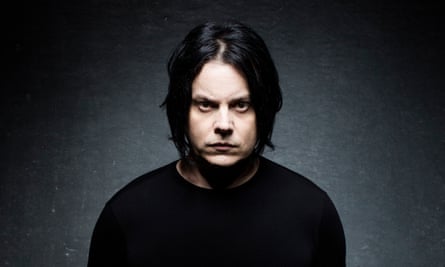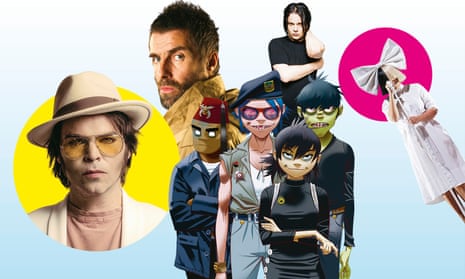People often talk about music going in cycles. However, after each cycle – flatulent indie, breathy electro, murmuring rappers who only use vowels – is complete, the artists who participated rarely disappear; they just continue releasing music that fewer people care about. Now is the perfect time to appraise these beings. This summer’s festival season will celebrate a litany of comfortable shoe-wearing men who peaked in the 90s and early 00s, bedded among otherwise youthful lineups. Gaz Coombes, Richard Ashcroft, Travis, Manic Street Preachers and Ocean Colour Scene are all set to descend upon fields across Europe; acts who were once big enough to headline, but are now lower on the bill, or targeting more niche events for the committed fan. There is, of course, nothing wrong with performing and releasing new music into middle age and beyond; many artists’ best work happens after mainstream fame. But if you are going to do so, here are a few suggestions on how to proceed without making a complete fool of yourself.
Don’t: Shit all over the people who got you there

Jack White is still in a fertile creative period and his last three records have seen his screechy blues become more mature and experimental without suffering any commercial drop-off: Blunderbuss, Lazaretto and Boarding House Ranch all charted at No 1 on Billboard. After White’s appearance on the last Beyoncé record, you could even argue that he’s now the acceptable face of old school rock’n’roll.
We’d hold him up as a shining example of how to do it, if it wasn’t for a recent interview with Rolling Stone in which White was asked about songwriting; specifically, if a song he’s writing ever feels more like a White Stripes track than something he’d do as a solo artist.
“That doesn’t really happen too much,” he said. “I’m not telling people what to think about the White Stripes. They can think whatever they want about it. But there is a case to be made that in a lot of ways, the White Stripes is Jack White solo ... There’s only two people in the band. I was writing and producing and conducting. The melodies are coming from one person, the rhythm is coming from Meg.”
This is a misunderstanding of why people liked the White Stripes. They were a fine garage rock band with some decent songs – so are lots of bands – but what made them magnetic was the mysterious husband-wife/brother-sister/matching-Benetton models chemistry between Jack and Meg. Every frontman needs a foil, and often it was Meg’s surly indifference that made Jack’s madcap hollering bearable. Without Meg, the White Stripes would just be a bloke that looks like Captain Jack Sparrow-got-into-the-Red-Pill, conjuring up a vague sense of Americana.
Don’t: Go out under a daft name
A few years ago, Liam Gallagher, once the biggest rock star in the world, was playing mid-afternoon festival slots with Beady Eye. This was a band that embodied all the worst bits of Oasis – unnecessary cravats, crude glorification of the 60s, Gem – without any of the tunes or drama. It didn’t go well, with Gallagher himself acknowledging that audience interest dwindled so fast the band would be “playing pubs” if they had released a third album.
So, Liam Gallagher went away and returned as, um, Liam Gallagher. He started playing more old Oasis numbers, and co-wrote an album of new songs that sounded like old Oasis songs, and now he’s sold more records than Harry Styles and is set to headline his own giant festival in London’s Finsbury Park. Quite the turnaround for what is basically still Beady Eye.
Don’t: Pretend to be something you’re not
Babes, just because you spent two weeks in LA and went for a hike once, doesn’t mean that you can claim your new album channels Frank Ocean’s Blonde and “Californian weed”. You are not in Odd Future, you don’t need to be down with the kids; the kids are not going to get the third Gaz Coombes solo record. I’ve had a listen to the first single; it’s influenced by 80s post-punk and 90s indie, and is so exactly on the nose of what you might expect a Gaz Coombes single to sound like, you can almost hear Steve Lamacq saying: “And that was the new single from Gaz Coombs” at the end of it. That’s fine; you do you. You just don’t need to pretend you’re a SoundCloud rapper.
Do: Remain angry
Once you’ve got the studio built in the garage and a string of middle-aged mates who want to come round and jam, it’s easy to stop caring too much about how your music actually sounds. One way to prevent your music career becoming the musical equivalent of time on the allotment is to remain furious about the state of modern pop. Julian Casablancas, sometime Strokes frontman, now back with his umpteenth solo album, recently gave a rambling interview to Vulture. In it, he drew parallels between the current state of music and the way the promise of the internet to democratise politics has been broken so that the opposite has happened. He talks about the way music is now made to work “at a CVS or in a taxi or in a nightclub or for a three-year-old”, which is a fairly good description of the kind of genreless mulch that clogs up Spotify playlists these days.
OK, so he chose some odd examples: Casablancas picked Ariel Pink as an artist who should be paid more attention, though he was given a fair amount of praise a few years ago, which he squandered by being an unparalleled arsehole. Casablancas also claimed that David Bowie was an underground artist in the 1970s, which is a bit odd considering Bowie had three No 1 albums in the UK during that decade. Still, it’s better to care about the state of music than resort to the old cliche so beloved of ageing rock stars: that they’re just making music for themselves, and if people like it, that’s a bonus.
Do: Get an alias

It’s bleak, but the most successful way to stay relevant with a young audience long after you’ve hit middle age is to completely obscure your face so no one knows how old you are anyway. Deadmau5 is 37, Sia is 42, Daft Punk are in their mid-40s and Damon Albarn and Jamie Hewlett, the men behind Gorillaz, both turned 50 this year. Yet all are played on pop radio when other artists of a similar age have been exiled to the pages of Mojo. Ageism may be more rife in pop than any other industry, and it’s reductive to say that just because someone is old they can’t connect with a young audience. But if you’re looking for a quick hit, whacking a big mask on can do the trick.
Don’t: Allow yourself to become a nostalgia act
Last year, the algorithms that govern BuzzFeed published a listicle entitled 33 Singers That Only Exist in the Memories of British Millennials, remembering such acts as Big Brovaz and Fame Academy winner Alex Parks.
Kate Nash, who spotted herself at No 9 in the list, tweeted: “I don’t think this contribution from BuzzFeed or from any other media outlet is helpful or interesting ... I have huge problems with how the industry disposed of artists, it’s a difficult career to maintain so this is actually a discussion I think is important. But not to just take the piss out of artists that got dropped or aren’t in the charts anymore ... Sorry but it’s not a joke to me.” Nash is right; people assume too easily that just because they have lost interest in an act, that they have disappeared from all existence and are only useful as a punchline. Performers facing this fate should follow Nash’s example and actively reclaim their existence. The Magic Numbers should stand naked on Speakers’ Corner shouting: “We are here” until they’re moved on by police.
There has to be a middle ground, of course: artists who play for a few hundred fans when once they played to a few hundred thousand can’t demand the same rock star treatment. But if you’re willing to be humble about being less popular than you used to be, then everyone else should just let you get on with it. Even if you’re Gaz Coombes.











Comments (…)
Sign in or create your Guardian account to join the discussion